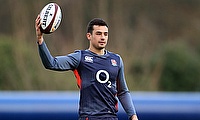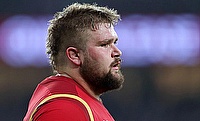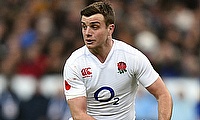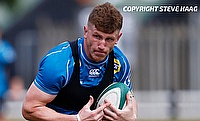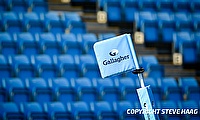Do Sale’s summer signings indicate a team ready to compete again?
Since the title-winning season of 2005-06, it is fair to say Sale Sharks have never come close to repeating the glitzy heights enjoyed by Chabal, Hodgson, Robinson and others.
Incrementally decreasing financial investment from owner Brian Kennedy (who lost his vigour for North-West rugby after injury prematurely ended the career of his son Jonny in 2011), colluded with the emergence of new powers in the domestic game such as Saracens and Exeter, and Sale rapidly found themselves as one of the ‘have-nots’ of the Premiership.
Indeed, Sale have spent much of the last decade stuck in rugby purgatory. Backed by one of the strongest academy pipelines in European rugby, the Sharks have never particularly found themselves in danger of relegation (a woeful first half of the 2012-13 season aside) but concurrently have never enjoyed the strength in depth necessary to mount a consistent and sustained challenge on the Premiership top-six and four. In the years in which Sale – who have held the ingenious title of lowest club payroll for the last four Premiership seasons – were able to sneak into the top-six and secure European Champions Cup Rugby (2015-16, 2013-14, 2011-12), the additional strain on a threadbare squad saw them finish 10th in two of the subsequent years and 7th in 2014-15.
The issue was thus: even with a lack of capital to attract the international superstars the teams around them were recruiting, Sale, with a squad built-on emerging academy talent and a number of cheap, shrewd acquisitions from all corners of the globe, had proven themselves at worst a lower mid-table Premiership side. However, to advance as a club, the team desperately needed a (hitherto mythical) money tree to build a squad that would allow them to genuinely compete on two fronts and ensure the gains made by European Champions Cup qualification did not compound their domestic campaign the season after.
Enter Simon Orange and Ged Mason.
In June of last year, Sale Sharks announced that a takeover deal by North-West business consortium CorpAcq had been completed with promises of renewed financial investment into the playing squad to buttress and augment the existing spine of players who had graduated from the academy. The new owners and ever-present Director of Rugby Steve Diamond tactfully announced they weren’t going to waste money building an inherently unsustainable Galacticos side – as evinced by their refusal to fork over the wage demands of Kyle Eastmond later that summer – but instead carefully recruit top-class players in positions the academy had not been able to fill.
Most Sale fans, myself included, were sceptical that this brain trust would come good on their promises. After all, this was coming from a club whose promises of two “top-class international signings” in early 2014 turned out to be the 38-year-old Peter Stringer and an All Black capped twice in 2009, Bryn Evans (that both turned out to be astute signings doesn’t undermine the point the club has long had a problem managing supporter expectations).
And for a long time, the communal scepticism went untreated. Promises of current tier 1 internationals failed to materialise for months whilst Sale’s closest competitors – Gloucester, Newcastle, Harlequins etc. – all strengthened considerably. The situation was compounded further when the first signings made under Sale’s new regime were the rather underwhelming pair of Will Cliff and Marc Jones, two players who had left the Sharks two seasons ago to join a promoted Bristol and would be re-joining the club having not been offered new contracts at the relegated West Country club.
Then, out of the blue, BBC Scotland broke the news that the club had agreed a deal to sign Scottish international No.8 Josh Strauss. The club quickly confirmed and Sale, having beat off the interest of a number of Premiership clubs, announced their most impressive signing since the returning mercurial talent of Danny Cipriani back in 2012.
What followed were a number of impressive low-key additions to bulk out the team’s previously shallow depth. Well-regarded South African forward Jono Ross was handed a lifeline from the all-encompassing turmoil surrounding Parisian side Stade Français and became the second South African back-rower (Strauss was born in the Western Cape) to join Sale ahead of 2017-18. The club then bolstered their front-row depth with the addition of Alexandru Tarus, an international tighthead from a country renowned for its scrummaging prowess (Romania) and WillGriff John, another prop who turned heads in the Championship for Doncaster this season.
Then came the news that indicated Sale were finally back in the big time.
After months of rumours, whispers and a bizarre statement from the club, Sale announced they had signed two talents that, in previous years, supporters could only dream about – Springbok scrum-half Faf de Klerk and Australian international fly-half/centre/winger/fullback James O’Connor.
The signings of de Klerk and O’Connor not only addressed significant flaws in Sale’s squad composition i.e. a lack of an elite-level scrum-half and inside centre, but also served as firm signals that the club once again have the financial might to attract the calibre of player to make a sustained run both domestically and in Europe.
Sale should not be expected to make a jump from 10th to top-four contenders this season; de Klerk will likely only arrive at the club in late September and Diamond has the (positive) issue of finding where James O’Connor best fits in the incumbent Sale backline. A 10-12 axis of AJ MacGinty and O’Connor would offer Sale a dynamic midfield combination, but if Josh Charnley continues to struggle to acclimatise to the 15-man game, Sale’s most pressing vacancy might see O’Connor start his Sale career in the No.11 shirt.
But for the first time in over a decade Sale are trending upwards – and have the infrastructure and resources to stay there. de Klerk, O’Connor and Strauss are the marquee names the club has long sought to bolster both their standing on and off the field, Ross, Tarus, Cliff, Jones and John are strong pickups to supplement the club’s depth and provide competition in positions that have long lacked competitiveness. And as is the norm in the North-West, the latest crop of academy talent including recent English callups Ben and Tom Curry, Sam James, Josh Beaumont, Mike Haley, Ross Harrison and a bevy of others including Cameron Neild, Mark Jennings and Will Addison, are an exciting spine for a club that, pleasantly, is no longer solely dependant on its academy to flourish as a Premiership club.

